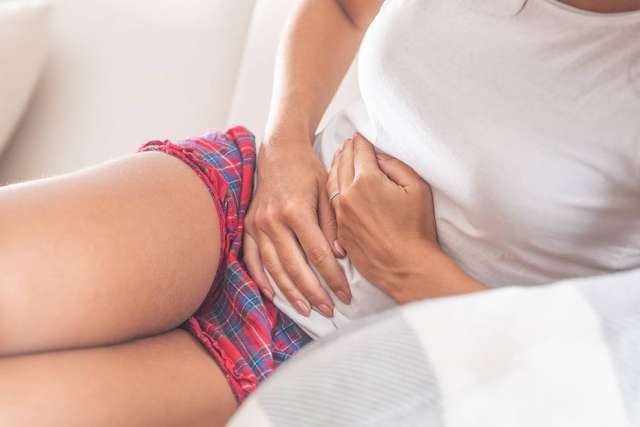Inflammatory bowel disease, or IBD, is an umbrella term for two conditions that cause chronic inflammation of the digestive tract: Crohn’s disease and ulcerative colitis. Because IBD patients are often on an immune-suppressing medication to keep their disease in remission, many want to know if they are at increased risk for contracting SARS-CoV2 -- the virus that causes COVID-19 – or of having a severe course of the coronavirus disease.
While information on COVID-19 is evolving and the prevalence of infection in IBD patients is difficult to determine, the question of whether IBD patients have a more severe course of disease than the general population if they contract COVID-19 is being examined in the SECURE-IBD Database. The worldwide registry traces COVID-19 outcomes in IBD patients.
Physicians must also consider other factors that affect the risk of a poor outcome with COVID-19, such as age and the presence of other health conditions, including diabetes, obesity, high blood pressure and lung problems. Older people with other health issues have proven to be at greater risk of severe presentation of disease.
With these considerations in mind, information collected to date is reassuring, and suggests that IBD patients on standard IBD therapies, excluding prednisone, do not have a worse outcome of COVID-19 compared to the general population, says gastroenterologist Jenny Sauk, MD, director of clinical care for the UCLA Center for Inflammatory Bowel Diseases.
“We think that in most cases, the benefits of remaining on IBD medications to maintain remission outweigh the risks,” Dr. Sauk says.
Here are six things IBD patients should keep in mind to best manage their disease in the time of coronavirus:
Remain on your IBD medications if you don’t have COVID-19
“If an IBD patient does not have COVID-19 and does not have known infection with SARS-CoV2, we want them to remain on the medications that are keeping them in clinical remission during this time,” Dr. Sauk says.
Dr. Sauk provided a couple of reasons for this approach. The first is that because IBD is characterized by an overactive immune system, patients on immune-suppressing medications, such as infliximab or ustekinumab, are brought to a “normal” baseline, where the immune system is not overactive. This allows the bowel to eventually heal. “If you take away the medications,” she says, “the immune system can get more activated and cause flare-ups.”
Another reason to stay on IBD medications is that usually the effects of those medications remain in the system for awhile, which means that going off them is not likely to immediately decrease one’s risk of infection, Dr. Sauk says.
“The risk of not being on your medication and having an IBD flare is much worse and would outweigh the benefits of stopping the medication,” she adds.
The one medication that patients should consider tapering down is high-dose prednisone, meaning 20 mg per day or more. Use of this steroid does seem to increase the risk of poor outcomes with COVID-19 infection, Dr. Sauk says. Patients on high doses of prednisone should contact their provider to discuss how to safely taper off this medication under the direction of their health care team.
“If you have any questions about your medication, you need to reach out to your physician to have a conversation about this,” she says, noting this type of consultation can likely be handled as a video visit. Your provider will be able to guide you through the available data.
Come in for your infusions
Many patients that are on an infusion protocol using a biologic, such as infliximab or vedolizumab, want to know if they should postpone their appointments. In most cases, Dr. Sauk says, the answer is no. “If a patient is not experiencing symptoms of COVID-19, I am encouraging them to come in for their infusions to maintain remission,” she says.
Dr. Sauk notes that all UCLA Health infusion centers have adopted a rigorous pre-screening policy, with patients, visitors and staff screened for fever and other symptoms that might be related to COVID-19 before they enter the clinic. In addition, the centers follow physical distancing guidelines and space patients out in the infusion chairs, require all patients and staff to wear face coverings and follow other strict infection prevention policies to ensure that patients are safe during their infusions.
Patients going to a non-UCLA infusion center should call ahead to confirm that all of these safety precautions are in place.
Do not delay important procedures
Though most health systems delayed non-essential procedures in March and April, all types of procedures are now proceeding as planned.
Like the medical offices and infusion centers, UCLA Health’s outpatient procedure units adhere to the strictest infection prevention policies. Anyone scheduled for a procedure must have a COVID-19 diagnostic test one to two days in advance, and if the test is negative, the procedure will move forward as planned, Dr. Sauk says.
“If someone is having an IBD flare or a new presentation, in which the scope might make a difference in understanding the next steps and the disease management strategy,” Dr. Sauk says, “it is important to move forward with that procedure and not delay care.”
An exception is if the COVID-19 diagnostic test is positive or if the patient presents with flu-like symptoms on the day of the procedure. In that case, Dr. Sauk says, the procedure will be postponed and the patient will be provided with additional guidance on how to manage their symptoms and move forward with their care.
For patients who aren’t sure how to proceed, Dr. Sauk notes that a video visit may be appropriate to discuss options. “We’re available to talk this through with you, so don’t forget to reach out,” she says.
About half of COVID-19 patients have GI symptoms
The majority of COVID-19 patients present with fever and upper respiratory symptoms, Dr. Sauk says, but roughly half of patients also have gastrointestinal symptoms, such as diarrhea. Typically, the GI symptoms are accompanied by upper respiratory symptoms or fever with COVID-19.
If an IBD patient is concerned about COVID-19 and has GI symptoms accompanied by fever or other atypical symptoms, Dr. Sauk will consider obtaining a COVID-19 test first. If the test is negative, Dr. Sauk will evaluate further for disease flare. If the test is positive, “I have been holding IBD medications for roughly 14 days and monitoring for resolution of COVID-19 symptoms,” Dr. Sauk says.
She advises: “If you think you may have COVID-19 or if you have a confirmed COVID-19 test, you need to reach out.”
Do not add immune-boosting supplements without provider input
When it comes to dietary changes, Nancee Jaffe, MS, RDN, chief digestive diseases dietitian at UCLA Health, notes that video visits have allowed her to continue working with patients on their digestive issues, including IBD symptoms, gas, bloating and constipation.
She wants to warn patients against going on supplements meant to boost the immune system, without first working with a dietitian or other provider.
“I’ve been reminding patients that we really don’t know a lot about the immunologic aspects of COVID-19, so there is no reason to jump on a bandwagon when friends tell you that ‘everyone should take Vitamin C’ or ‘everyone should take zinc,’” Jaffe says. “We don’t know what will help prevent a severe case of COVID-19, and enhancing certain arms of our immune system could actually make things worse.
“The best things we can do for our immune system,” she continues, “is make sure to eat a healthy diet, get adequate sleep, manage stress (such as with mindfulness meditation, breathing exercises and yoga), incorporate some physical activity and stay connected to family and friends. These are actually better ways to boost our immune system than taking supplements.”
Don’t forget physical distancing and hand hygiene
As we move forward in this new normal, Dr. Sauk reminds IBD patients that though there are a few special considerations, practicing physical distancing, wearing a face covering in public spaces and following proper hand hygiene, while remaining on IBD medications, is their best course of action.
“We want to keep IBD in remission, and patients away from steroids and the hospital,” she says. “We realize what a stressful time this is for all of our patients, and at the UCLA IBD Center we aim to provide not only the most up-to-date medical advice we have, but also emotional support and reassurance during this challenging time.”
If you would like more information about the UCLA Health response to COVID-19, visit our dedicated website at uclahealth.org/coronavirus.




